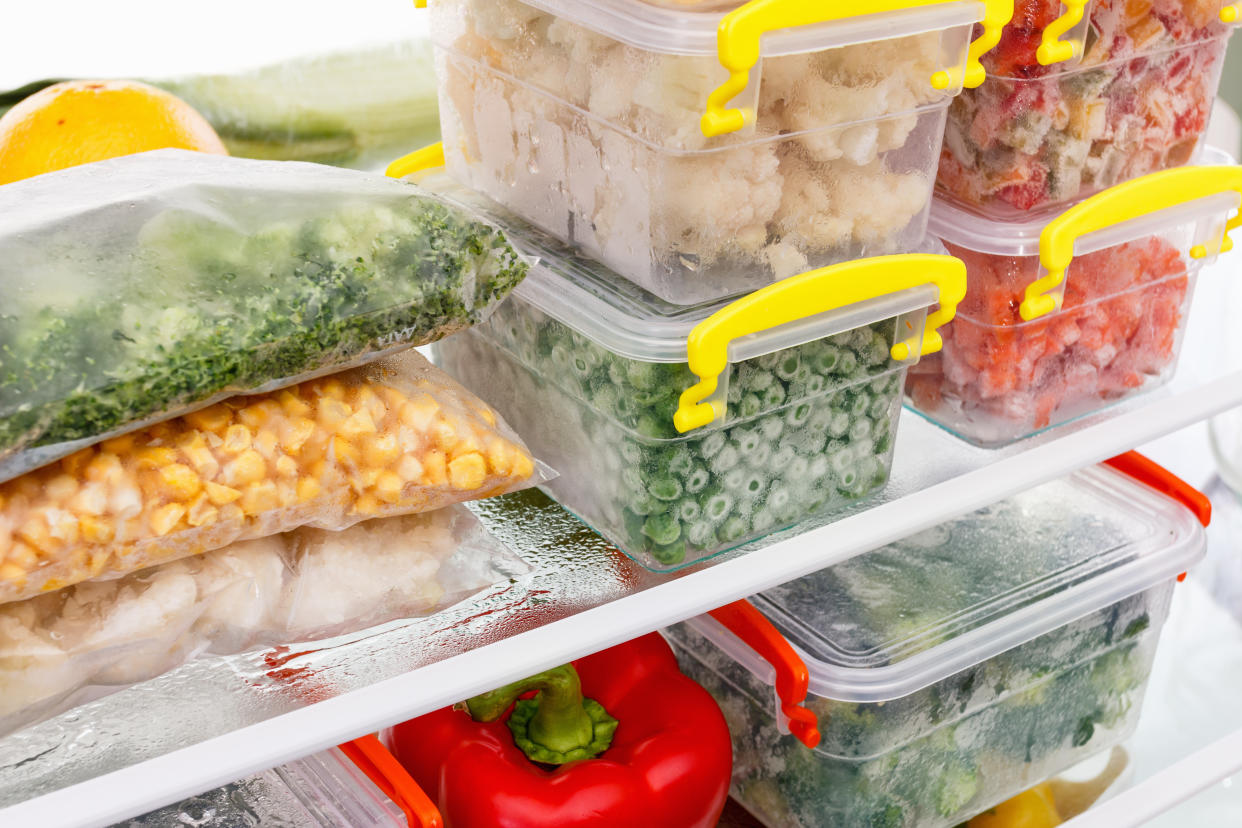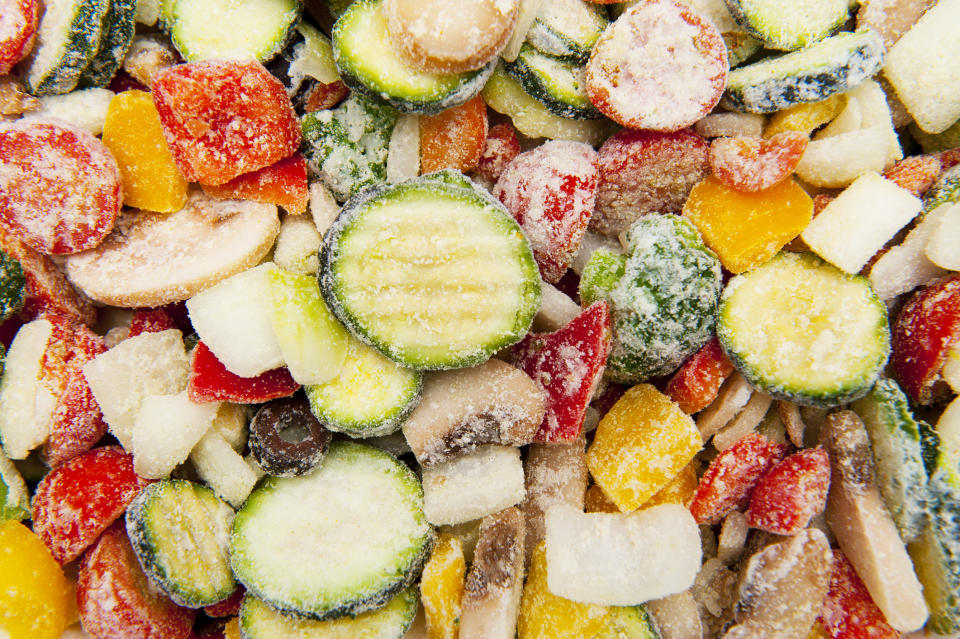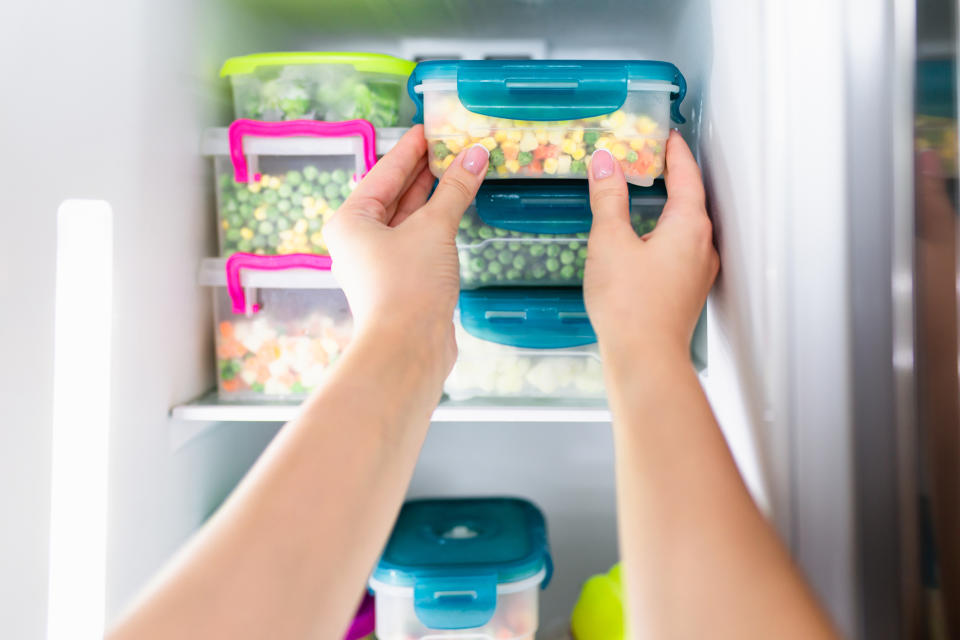The foods you can and can't freeze

We could soon discover a new found appreciation for the humble freezer amid the coronavirus outbreak.
The latest government recommendations are calling for people to avoid all but essential socialisation, while anyone who has or lives with someone showing symptoms has been asked to self-isolate for 14 days, which means it’s looking increasingly likely we’re going to be spending a lot more time at home.
If you’re already WFH or are preparing to stay home more than usual, it’s important to have healthy foods on hand to see you through.
And freezers could be our best friends in these coronavirus-laced times.
But while it is tempting to chuck all that food you’ve panic-bought into the freezer, in fact there are some foods (and drinks) that don’t do too well if they are frozen.
Think soggy salad leaves, flavourless fruit and fizzy drink explosions.
On the upside there are some surprising food stuffs that actually freeze amazingly well and could have you rethinking your whole kitchen ethos, even post corona isolation.
Well, we have to look for some positives in these worrying times right?
"In the current climate, many of us may be looking for ways to make our food last longer,” explains Kirsty Oakes, Head of Marketing at Hammonds Kitchens.
“Freezing food is a great way to do this, but there are some important things you need to keep in mind relating to certain types of food, the length of time in which they can stay in the freezer and how to defrost and reheat them properly,” she adds.
Read more: M&S launches cheese Easter eggs

So how do we know how wide to cast the frozen net?
“As a general rule of thumb, foods with higher water content freeze less well,” explains Joey O’Hare, Head Development Chef at allplants.
“This is due to the fact that water expands as it freezes; the water content of each cell breaks through its cell walls within the food, and thus on defrosting can present a soggy mess!
“This is often why we see so much fluid present around food that's been taken out of the freezer to thaw overnight,” she adds.
“By freezing food, you're pressing the 'pause' button; it will not lose any nutrients or deteriorate in any way. There is power in frozen food – it's a great way to preserve vegetables and fruit that pack a nutritional punch.”
Which is exactly what we need right now to help keep our immune systems as tip top as possible right now.
So without further ado here’s our expert-backed guide to the foods you can and can’t freeze.
What can you freeze? In short, so much more than you think!
Bread: Sliced bread and bread crumbs
Fruit: Frozen berries, sliced bananas, pineapple, mangoes and peaches which are perfect for making smoothies or topping yogurt and oatmeal.
Herbs: Hard herbs, or ice cubes of soft herbs in oil
Liquids: Homemade stocks or soups
Meals: Left-over curries, stews and dahls
Vegetables: Chopped onions and tomatoes; blanched broccoli florets; green beans; spinach; cauliflower; chopped butternut squash can form the foundation of the majority of your meals.
Tofu - Sliced tofu (with parchment paper between!)
Herbs - “Fresh herbs, eg parsley, basil, rosemary, coriander are high in vitamin C and therefore great to support immunity as well as flavour foods,” explains Laura Southern, a nutritionist for www.london-gynaecology.com
“I recommend chopping fresh and freezing in ice cube trays, or turning into pesto (with olive oil, salt and pepper) and freezing to add flavour to pasta, sauces, stews etc.”
Baked goods - “Surprisingly, cakes, flapjacks, cookies and other baked goods can also be frozen in clingfilm, and then defrosted in the microwave when they are ready to eat,” says Oakes.
Read more: Quick and easy at-home lunch ideas (that aren't sandwiches)
And what not to freeze? Very little!
Vegetables with high water content and delicate leaves - cucumber, salads, lettuces etc.
Eggs (unless cracked into small containers)
Artichokes, chicory, aubergine, potatoes (unless they're mashed), radishes, or sweet potatoes don't freeze well.
Soft cheese - According to Charles Reilly, Managing Director at Fridgesmart you shouldn’t freeze soft cheeses like cottage cheese and ricotta. “This is due to them having a high water content, these foods will become soggy upon thawing and unsuitable to eat,” he explains.
Carbonated drinks - The frozen gas may expand and explode in your freezer, causing a bit of a mess.

Get the most out of your freezer
Know your freeze-safe time frames
“You can safely freeze most cooked dried goods, such as cooked pasta and rice, for about three months,” advises Oakes.
“Raw and cooked meat is safe to freeze (four months for raw meat, three for cooked meat), as well as dairy items such as butter, grated cheese and eggs (which you can crack into a container and then freeze – don't freeze them in their shell).
“Bread can be frozen for up to three months,” she adds.
Check de-frosted foods are cooked through
Although some dishes can be cooked from frozen, when it comes to meat, you MUST check that it's cooked through before serving.
“The meat must reach a core temperature of 70°C for at least 2 minutes to destroy any harmful bacteria,” Oakes explains.
"Cooked food such as pasta can be heated up in the microwave as long as it's cooked through before you eat it.
Oakes says frozen fruit can be left out to thaw or used in smoothies or desserts, and you can heat up bread slice by slice in the toaster.
Know the freezer storage rules
According to Reilly meat, poultry and fish should be stored at the bottom of the freezer and kept in containers and not on the same shelf as any other non-meat items. “Fruit and vegetables can be placed higher in the freezer, in sealed containers to prevent any leakages,” he continues.
“Dairy products such as milk and yoghurt can go above this, making sure the milk is not full to the brim to avoid the lid bursting. Lastly, bread pastry and chips can be stored at the top.”



